Process & Values
Serving kids and their families is my primary purpose. I enrolled in hair school to marry a special interest (natural hair care) with a material need (helping my niece).
Like many of you, I cried through perms and ear burns. I luckily learned “how to sit” and I want different for the next kids. We don’t want to pass on trauma but we do. I do. But learning how to sit needs to be our responsibility. Working with anyone, but especially kids, I continually learn how to sit: with frustration, time constraints, physical and mental tiredness… Among the thousand words this glamor shot of 4 year-old me is worth is, “OUCH!”
I love this photo and I love my mother for the keepsake, and I can remember the discomfort and exhaustion that tiara-less toddler went thru at the mall that day. My priority is to minimize physical and emotional pain for all involved and to lean deep into the belief that hair care is a continuous process, not a photo finish.
Most of my adult clients are Black, Trans, Queer, neuroexpansive, neurodivergent, autistic, and chronically ill. The few exceptions still can check most of those boxes.
I provide gender affirming care so folx can move through the world satisfied with their appearance, confident that who they are matches how they are perceived.
I recognize that Black, queer people with pronounced and/or hidden disabilities need affordable access to health care. Hair care is health care! Affordable access to comprehensive health services, including specialized hair care, is crucial for our overall well-being. I address the intersections between race, gender identity, well-being, and hair health care access by structuring my prices based on a living wage for me and competitive rates for my clients.
The services I provide are tailored to disabled folx and their dependents. This means, whether you have a hurdle between yourself and self care, or on the way to caring for another, I listen and I don’t judge. My job is to help deescalate hair emergencies and establish routines to make self sufficiency possible.
I experienced cultural trauma, including the sensory overload of being tenderheaded. I respect our traditional survival techniques. Texturism—-racism against nonconforming hair types and styles—-is real and remains relevant. DEI (and my CRT doctorate) may be defunded, but our collective pursuit of being our fullest selves continues. Our hair is personal and political and deserving of our gentlest care.
During the consultation, we discuss hair health and goals. We can build a plan to address any immediate needs—with consideration of what state your hair will be in once the cleansing and conditioning service is complete.
Booking a consultation begins the treatment planning process. This is the best way to prepare for a successful client-stylist relationship that balances our different responsibilities and needs, rather than putting them in competition with one another.




